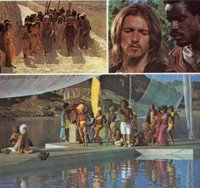Silverscreen Beats: Last Temptation of Christ
 The final part of BBC Radio 4's Silverscreen Beats series on Jesus films aired on Friday with a look at Last Temptation of Christ. It's a score that has gained wide acclaim, and many have cited it as composer Peter Gabriel's finest work. Certainly it gives the film a real edge, and whilst much of the music is more Arabic than Hebrew, the score's middle-eastern sound heightens one's awareness of the location, reminding the viewer that this story took place in a different place and in a different time.
The final part of BBC Radio 4's Silverscreen Beats series on Jesus films aired on Friday with a look at Last Temptation of Christ. It's a score that has gained wide acclaim, and many have cited it as composer Peter Gabriel's finest work. Certainly it gives the film a real edge, and whilst much of the music is more Arabic than Hebrew, the score's middle-eastern sound heightens one's awareness of the location, reminding the viewer that this story took place in a different place and in a different time. The analysis on this episode of Silverscreen beats is possibly a little greater than for the other four programmes. I particularly appreciated the comments made by co-producer David Bottrill about the uplifting music used at the end of the film. It's one of my favourite parts of the film. Many have criticised the film for, amongst other things, its exclusion of the resurrection. However, this misses the point of what the sound (and indeed the visuals) do at this point. The intense flashing images and the up-beat music not only hint at the resurrection that is to come, but it is also practically the only film that celebrates the victory that Christians believe Jesus won on the cross. Most films only focus on the sadder aspects of the crucifixion, rather than those aspects that gave the day it is celebrated the title Good Friday.
One of the things that the programme mentions is how Scorsese actually cut certain aspects of the score, most notably in the scene when Jesus comes down off the cross. Even so, the score is not without its own controversy. In "Imaging the Divine", Lloyd Baugh objects to the way the film juxtaposes the most solemn ritual in the film, the jewish seder / Last Supper, with the Muslim call to prayer, calling it one of the film's "grotesqueries"1.
What the programme didn't mention was how the film influenced the score for The Passion of the Christ. I remember how at the time a number of people were amazed that Gabriel was not credited in some way. For example, Jeffrey Overstreet wondered if it might qualify as "musical plagiarism", noting how "the themes and flourishes here are so similar that some will swear it’s exactly the same music. It would only have been fair to credit Gabriel’s influence".
1 - Lloyd Baugh, "Imaging the Divine : Jesus and Christ-Figures in Film", Kansas City, MO: Sheed and Ward (1998) p.59.




















